Sharp Drop-Off in Honorary Degree Awards to Blacks From the Nation’s Highest-Ranked Colleges and Universities
In the spring of 2006, 24 honorary degrees were awarded to blacks from the nation’s 30 highest-ranked universities and 30 highest-ranked liberal arts colleges. This is the lowest number of honorary degree awards to blacks since JBHE started tracking these statistics in 1994. In the 12 years that JBHE has surveyed the honorary degree awards of the nation’s top-rated colleges and universities, the number of awards bestowed on blacks has ranged from a high of 38 in 1996 to a low of 24 this year. The previous low was 28 honorary degrees to blacks.
Four high-ranking universities — Brown University, Harvard University, Northwestern University, and the University of Pennsylvania — each awarded honorary degrees to two African Americans this year.
Three black scholars were awarded honorary degrees from two high-ranking colleges or universities this spring. Winning two honorary degrees each were Henry Louis Gates Jr., Shirley Ann Jackson, and Robert Moses.
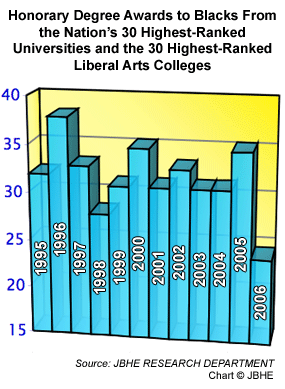
  |
“Focusing your life solely on making a buck shows a poverty of ambition. It asks too little of yourself. And it will leave you unfulfilled.”
— Earl G. Graves, publisher of Black Enterprise magazine, speaking at the 2006 commencement ceremonies of Cambridge College in Cambridge, Massachusetts
|
Opportunities for American College Students to Study Abroad in Africa
 University of Cape Town
University of Cape Town
There are more than 1,500 study-abroad programs at U.S. colleges and universities. Although the vast majority of study-abroad programs are at universities in Europe and Asia, there are several study-abroad opportunities sponsored by U.S. colleges and universities that offer up to a year of study at universities in black African nations.
The opportunity to study in Africa is often a powerful magnet for universities in attracting African-American college students. Thus it is quite surprising that most of the nation’s highest-ranked colleges and universities do not have formal study-abroad agreements with universities in Africa. These colleges and universities compete vigorously to attract black students to their campuses. It seems logical that those with an African study-abroad program would have an edge in attracting more African-American students. Yet, among the 30 highest-ranked universities and 30 highest-ranked colleges, only Brown University, the University of North Carolina, and the University of Pennsylvania have formal study-abroad agreements with African universities.
Racial Differences in Family Income of College Undergraduates
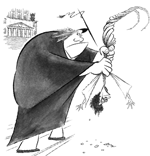 Often in the pages of JBHE we mention the fact that money to pay for college is one of the major reasons for the persisting racial educational inequality that exists in the United States. For example, one explanation for the high black student college dropout rate and why it is much greater than the rate for whites is because blacks have less money than whites to pay for college. The huge surge in tuition costs and other fees at private and state-operated colleges and universities also has put up huge barriers to educational opportunities for blacks. The increasing tendency for states and the federal government to allocate financial aid on the basis of merit rather than need makes it even more difficult for black families to pay for college. Often in the pages of JBHE we mention the fact that money to pay for college is one of the major reasons for the persisting racial educational inequality that exists in the United States. For example, one explanation for the high black student college dropout rate and why it is much greater than the rate for whites is because blacks have less money than whites to pay for college. The huge surge in tuition costs and other fees at private and state-operated colleges and universities also has put up huge barriers to educational opportunities for blacks. The increasing tendency for states and the federal government to allocate financial aid on the basis of merit rather than need makes it even more difficult for black families to pay for college.
But the reader may ask, Just how big is the income gap between white and black families with children in college? The answer is: Huge!
In 2004 nearly 57 percent of all black undergraduate students came from families that had incomes under $40,000. For whites, the figure was 24 percent. Only 9.4 percent of all African-American college students came from families that had incomes of more than $100,000. One quarter of all white undergraduates came from families with incomes of more than $100,000. Some 58 percent of white students had family income greater than $60,000. Only 26.5 percent of black undergraduates came from families with incomes above $60,000.
Remember too that these figures are only for families who actually had children who were enrolled in college. They do not include those families whose financial situation made it impossible for them to send children to college.

National-Louis University

Director, Undergraduate Academic Advising Center, Division of Student Affairs
National-Louis University invites applicants for the position of Director of Undergraduate Academic Advising Center (UAAC). This is a new initiative that offers a centralized university-wide academic advisement system for all undergraduate students attending our seven campuses. The UAAC is a part of the Division of Student Affairs. The Director is responsible for the supervision, management, direction and leadership of the staff and services of the Undergraduate Academic Advising Center. Duties include: developing and disseminating an advising model that links responsible student curricular choices with the goals of the University; overseeing the management and supervision of the UAAC; supervising, evaluating and motivating the UAAC team/staff -- including the advisement team and administrative staff; plan, executing and managing the UAAC budget; developing policies and procedures for student advisement, customer service delivery, academic advisors and support staff of UAAC; collaborating with office staff as well as faculty, staff and students in furthering the goals of the UAAC and the division of Student Affairs; oversee and coordinate UAAC programming activities that may be delivered through workshops, Internet technology, class presentations, outreach and other setting; serving as the primary UAAC liaison with academic programs/departments and participate in University-wide committees; evaluating, editing and granting final approval for all UAAC publications; and responsible for general academic advisement and registration of a case load of new and continuing undergraduate students, as needed.
Requirements: Master’s Degree required in College Student Personnel, Higher Education, Counseling or related field, Doctoral degree preferred. Possess 5-7 years previous experience working as an academic advising professional in higher education, demonstrating progressive responsibilities. Applicant will demonstrate: a proficiency with computer applications and ability to use technology to enhance the student experience; experience working in a university/college setting; an understanding of adult learner theory; a thorough understanding of student development theory and its application; an understanding of the academic structure (academic programs, curriculum, administrative units) of a university; an understanding of the fundamentals of programming and workshop development; strong organizational and planning skills; experience managing a budget; experience with developmental academic advising philosophy; experience working in a culturally-diverse setting; an ability to function independently and as a member of a team in a constantly changing environment; and excellent written and oral communication skills. Local travel will be required.
Please submit resumes with salary history to resumes@nl.edu. Applications will be accepted until the position is filled.
EEO/AA Educator and Employer.

Was Emory University Given the Cold Shoulder During Negotiations for Dr. King’s Papers?
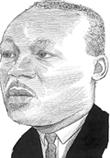 When it was announced that the papers of Martin Luther King Jr. were going to be auctioned, Emory University in Atlanta was mentioned as a potential buyer of the collection. The Atlanta Journal-Constitution reports that when it was revealed that Atlanta Mayor Shirley Franklin was attempting to arrange funding to keep the papers in Atlanta, Emory offered to contribute $3 million to the effort. Emory also volunteered its facilities to house the collection and its expertise in archiving the documents. But when the deal was completed, Emory had no part in the group that bought the documents for $32 million. Emory was not even listed as among the places where the documents could be displayed. When it was announced that the papers of Martin Luther King Jr. were going to be auctioned, Emory University in Atlanta was mentioned as a potential buyer of the collection. The Atlanta Journal-Constitution reports that when it was revealed that Atlanta Mayor Shirley Franklin was attempting to arrange funding to keep the papers in Atlanta, Emory offered to contribute $3 million to the effort. Emory also volunteered its facilities to house the collection and its expertise in archiving the documents. But when the deal was completed, Emory had no part in the group that bought the documents for $32 million. Emory was not even listed as among the places where the documents could be displayed.
The Journal-Constitution reports that there was a longstanding distrust of Emory by members of the King family. Some reports suggested that people associated with Emory had scoffed at the King’s family offering price, claiming that the documents were not as valuable as the family believed. The family felt that low-ball estimates of the collection’s value were circulated so that it could be purchased at a lower price if the auction had taken place.
Dillard Weathers the Storm
 When Hurricane Katrina hit New Orleans last August, the campus of Dillard University was inundated with up to eight feet of filthy water and mud. But Dillard President Marvalene Hughes was adamant that the university would be rebuilt and return better than ever. She promised the senior class that they would march between the great oak trees on campus for their graduation ceremony as has been done at Dillard for generations. When Hurricane Katrina hit New Orleans last August, the campus of Dillard University was inundated with up to eight feet of filthy water and mud. But Dillard President Marvalene Hughes was adamant that the university would be rebuilt and return better than ever. She promised the senior class that they would march between the great oak trees on campus for their graduation ceremony as has been done at Dillard for generations.
Hughes made good on her promise. Some 350 students received their diplomas earlier this month at commencement ceremonies on campus. The graduation ceremony was the first time many of the graduate students had been on campus all year. When the university reopened this past January, classes were held at the Hilton hotel in the downtown area.
The university hopes to move back into campus buildings for the start of the fall semester.
Thousands of Black Students in South Africa Are Dropping Out of College Due to the Lack of Financial Aid
The cost of financing higher education is a major issue not only in the United States. In South Africa about one half of the students who enter colleges and universities fail to graduate, and the major reason is because of financial difficulties.
Under current exchange rates, tuition at South Africa’s major research universities averages about $3,700. This is far out of reach of many black students in the country. University fees have doubled over the past five years while the budget of the national student financial aid program has risen by only 30 percent.
Appointments
• Willie J. Gilchrist was named interim deputy chancellor of Elizabeth City State University. He will serve as interim chancellor when Chancellor Mickey L. Burnim leaves to take over the presidency of Bowie State University.
Since 1994 Dr. Gilchrist has served as superintendent of the Halifax County school system in North Carolina. He is a graduate of Elizabeth City State University. He holds a master’s degree from the State University of New York at Brockport and a doctorate in educational administration from Nova Southeastern University.
 • Floyd H. Flake, president of Wilberforce University, the historically black educational institution in Wilberforce, Ohio, was named co-chair of the campaign committee for J. Kenneth Blackwell. Blackwell, an African American, is the GOP nominee for governor of Ohio. • Floyd H. Flake, president of Wilberforce University, the historically black educational institution in Wilberforce, Ohio, was named co-chair of the campaign committee for J. Kenneth Blackwell. Blackwell, an African American, is the GOP nominee for governor of Ohio.
Grant
• North Carolina A&T State University, the historically black educational institution in Greensboro, received a $158,572 grant from the Henry Luce Foundation. The grant will support two female students in the Ph.D. program in engineering at the university.
|
A Prescription for Success: Blacks in Professional Schools of Pharmacy
 While black enrollments in law, business, and medical schools appear to be treading water, there have been great strides in the number of blacks completing professional training at schools of pharmacy. In 2005 there were 8,242 graduates of pharmacy schools in the United States. Of these, 714, or 8.7 percent, were black. While black enrollments in law, business, and medical schools appear to be treading water, there have been great strides in the number of blacks completing professional training at schools of pharmacy. In 2005 there were 8,242 graduates of pharmacy schools in the United States. Of these, 714, or 8.7 percent, were black.
The number of blacks earning professional degrees in pharmacy in recent years has skyrocketed. In 1997 there were 172 black graduates of pharmacy schools. By the year 2000 the number of black graduates had doubled. In the next five years the number had doubled once again.
In 2005 there were 46,527 students enrolled in professional degree programs in pharmacy. More than 3,700 of these students, or 8 percent, were black. There were 98 black students enrolled in master’s degree programs in pharmacy studies. They made up 12.3 percent of all students enrolled in master’s degree programs in the field.
In 2005, 19 blacks earned a Ph.D. in pharmacy. They made up 4.4 percent of all doctorates in the field.
Under New Administration Rules, Welfare Recipients Will Not Be Permitted to Enroll in College If They Want to Retain Benefits
 New regulations governing welfare recipients issued by the Bush administration could sharply reduce the number of low-income people who are able to enroll in high education. The new rules require states to move more quickly to transfer people from the welfare rolls to payrolls. Previously, welfare recipients could still qualify for benefits if they were enrolled in higher education instead of working. But under the new regulations, welfare recipients will be allowed to continue to receive benefits for one year only if they are enrolled in vocational training but not in undergraduate or graduate degree programs. Associate degree programs at community colleges would be permitted but only if the student was enrolled in a program that trained him or her for a specific vocation. New regulations governing welfare recipients issued by the Bush administration could sharply reduce the number of low-income people who are able to enroll in high education. The new rules require states to move more quickly to transfer people from the welfare rolls to payrolls. Previously, welfare recipients could still qualify for benefits if they were enrolled in higher education instead of working. But under the new regulations, welfare recipients will be allowed to continue to receive benefits for one year only if they are enrolled in vocational training but not in undergraduate or graduate degree programs. Associate degree programs at community colleges would be permitted but only if the student was enrolled in a program that trained him or her for a specific vocation.
Since blacks are disproportionately poor, these new rules may have a severe damaging impact on black enrollments in higher education.
African-American College Students Are More Satisfied With Distance Education Classes Than Their White Counterparts
New figures from the Department of Education show only minor racial differences in participation in distance education courses among undergraduate college students. In 2004, 16.5 percent of all white undergraduates took a distance education course either through videoconferencing or on the Internet. For blacks, 15.2 percent of all undergraduates took a distance education course.
But there were major differences among the races in the level of satisfaction for distance education. Nearly 36 percent of all black undergraduates said that they were more satisfied with the overall learning experience in their distance education classes than they were with regular classroom instruction. For whites, only 25.9 percent of all undergraduates preferred their distance education experience to regular classroom instruction.
Perhaps the racial anonymity that distance education entails can be a benefit for black students. African Americans who take courses over the Internet or by watching a class taught by a teacher at a remote location may receive some benefit from the fact that the teacher and fellow students are not able to discern their race. In the distance education classroom, there are no visual clues to a student’s race and therefore all students may be treated without prejudice. In a regular classroom, black students are often stereotyped due to the color of their skin.
Blacks Make Significant Progress in Attainments of Two-Year Community College Degrees
Normally JBHE concentrates its research on black progress at four-year colleges and universities as well as in graduate education. But community colleges are also an important part of higher education, particularly for African Americans. About 42 percent of all African-American enrollments in higher education are at the nation’s two-year community colleges. For whites, the figure is 35.5 percent.
Blacks have made significant progress in the attainment of two-year associate’s degrees. In 2004 more than 81,000 African Americans were awarded two-year degrees. This is more than double the number from 15 years ago.
Two-year associate’s degree awards are important. Census data shows that blacks with some college or a two-year associate’s degree significantly increase their earning power over blacks with only a high school diploma.
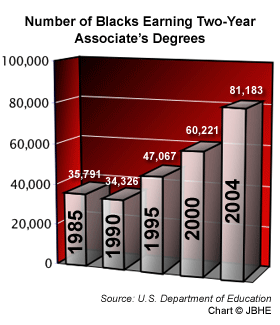
 The Racial Report Card for College Undergraduates The Racial Report Card for College Undergraduates
There is new data on just how well black students are performing in college, and the news is not that good. According to Education Department statistics, only 9.6 percent of black undergraduate students report earning mostly A grades since they have been in college. For whites, 19.3 percent of all undergraduates are A students.
More than 40 percent of all black undergraduate students in the United States report that they earn mostly Cs or lower on their college report cards. For whites, 24 percent say that they receive mostly Cs or lower.
The City Where Blacks Outperform Whites in High School Graduation Rates
 It may come as no surprise to readers that there is a huge racial gap in graduation rates at high schools in Dayton, Ohio. But what may be a big surprise is that the black graduation rate is 25 percentage points higher than the rate for whites. It may come as no surprise to readers that there is a huge racial gap in graduation rates at high schools in Dayton, Ohio. But what may be a big surprise is that the black graduation rate is 25 percentage points higher than the rate for whites.
The Dayton school district says that 76.3 percent of all black students who enroll in its high schools go on to earn a diploma. For whites, only 51.1 percent of the students graduate.
Only 21 percent of the students in the Dayton schools are white and a large percentage of the white students attend Belmont High School, which has a white majority. This school was rated by the state as in an “academic emergency.” The graduation rate for the small number of white students at the predominantly black high schools is even lower than the rate at Belmont High School.
New Institute Will Give Faculty and Students at Black Colleges Access to NASA Facilities and Equipment
 The National Aeronautics and Space Administration, which has a long history of cooperative agreements with historically black colleges and universities, has founded a new program that will give faculty and students at HBCUs increased access to NASA facilities and equipment. The NASA Science and Technology Institute for Minority Institutions will be funded with a $3.5 million grant to the United Negro College Fund. The institute will be headquartered at NASA’s Ames Research Center in Moffett Field, California. The National Aeronautics and Space Administration, which has a long history of cooperative agreements with historically black colleges and universities, has founded a new program that will give faculty and students at HBCUs increased access to NASA facilities and equipment. The NASA Science and Technology Institute for Minority Institutions will be funded with a $3.5 million grant to the United Negro College Fund. The institute will be headquartered at NASA’s Ames Research Center in Moffett Field, California.
  |
5.8% Percentage of all students enrolled in medical school in 2004 who were black.
5.8% Percentage of all students enrolled in law school in 2004 who were black
12.5% Percentage of all students enrolled in divinity school in 2004 who were black.
source: U.S. Department of Education
|
Virginia Union Back In Good Standing With Accrediting Body
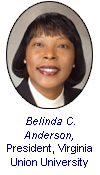 Virginia Union University, the historically black educational institution in Richmond, got some good news recently. The university received notice from the Commission of the Southern Association of Colleges and Schools that its accreditation warning had been rescinded. Last June, when issuing its warning, the commission had questioned the quality of the faculty in at least one department at the university. Since that time the university has hired additional faculty members who hold doctorates in order to satisfy the commission’s concerns. Virginia Union University, the historically black educational institution in Richmond, got some good news recently. The university received notice from the Commission of the Southern Association of Colleges and Schools that its accreditation warning had been rescinded. Last June, when issuing its warning, the commission had questioned the quality of the faculty in at least one department at the university. Since that time the university has hired additional faculty members who hold doctorates in order to satisfy the commission’s concerns.
There are about 1,400 undergraduate students at the university of whom 96 percent are black.
New Financial Aid Program May Benefit Thousands of African-American College Students in Florida
 Thousands of college-age students in Florida can now attend one of the 28 state-operated community colleges without having to pay a dime in tuition. The Bright Futures Medallion Scholarship was founded in 1997 and provides money for college for more than 100,000 students each year. This fall the program, funded by the state lottery, will pay 100 percent of the cost of attending community college, up from 75 percent in previous years. The scholarships are merit based but the qualifications are such that thousands of black and other minority students will be able to meet the requirements. Thousands of college-age students in Florida can now attend one of the 28 state-operated community colleges without having to pay a dime in tuition. The Bright Futures Medallion Scholarship was founded in 1997 and provides money for college for more than 100,000 students each year. This fall the program, funded by the state lottery, will pay 100 percent of the cost of attending community college, up from 75 percent in previous years. The scholarships are merit based but the qualifications are such that thousands of black and other minority students will be able to meet the requirements.
In order to qualify, students need to have a 3.0 grade point average in high school and to score at least 970 on the SAT college admissions test. While the score is well above the average score for blacks nationwide, there are thousands of black students in Florida who score above this level on the SAT.
To maintain their scholarships once they enroll in college, students must maintain a 2.75 grade point average and take a minimum of six credit hours. Students earning their two-year associate’s degree under the program can then transfer to a state-operated four-year university and have 75 percent of their costs paid for by the state.
 Award Award
• Willie Gary, a personal injury lawyer from Stuart, Florida, received the Martin Luther King Jr. Award from the National Education Association. Gary was honored for his contributions to historically black colleges and universities and for his efforts to encourage black children to stay in school.
|

